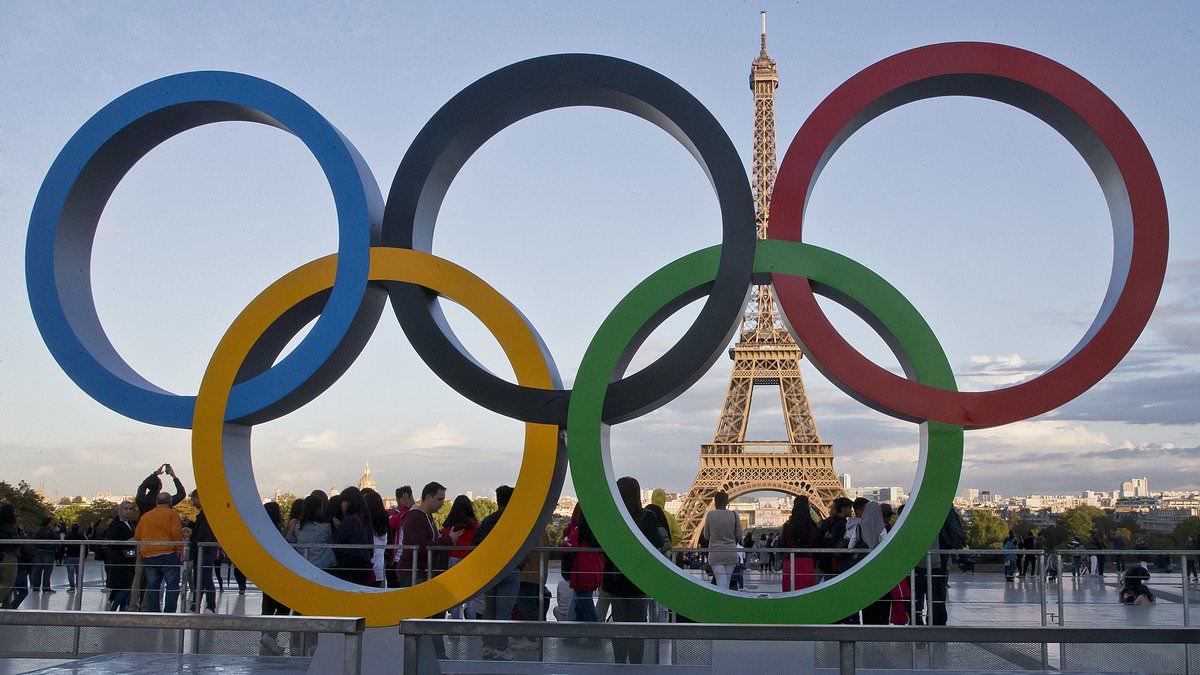The men’s triathlon at the Paris Olympics has been postponed from Tuesday to Wednesday because of concerns over water quality in the River Seine following a $1.5 billion cleaning effort.
Swimming training for the triathletes was canceled on Sunday and Monday and the decision has been taken to move the men’s race from 8am local time Tuesday to Wednesday at 10:45am. The women’s race will remain as scheduled: Wednesday at 8am.
Read More
How the woke Olympic village is ENDING world-record hopes after Coco Gauff revealed her team left

A statement from World Triathlon said Friday remains a contingency day if one or both of the races are unable to go ahead: ‘Tests carried out in the Seine today revealed water quality did not provide sufficient guarantees to allow the event to be held. Despite the improvement in the water quality levels, the readings at some points of the swim course are still above the acceptable limits.’
Exacerbating the issue are weather forecasts that call for rain showers and even some storms between Tuesday night and Thursday. Rain typically raises bacteria levels in the Seine, where June tests revealed unsafe levels of E. coli – a potential sign of fecal matter and disease-carrying germs.
According to World Triathlon Federation standards, E. coli levels beyond 900 colony-forming units per 100 milliliters is considered unsafe.

The men’s triathlon at the Olympics has been postponed because of the Seine’s water quality

Training sessions for the Olympic triathlon event in Paris have been cancelled in recent days
Comment now
Organizers also had the option to drop the swimming and make the event a duathlon.
More than €1.4billion (£1.1B/$1.5B) was spent on cleaning up the river in preparation for the Games. Those efforts included the creation of a giant basin to capture rainwater while preventing wastewater from finding its way into the river. Furthermore, sewer infrastructure was renovated and wastewater treatment plants were also upgraded.
However, organizers knew heavy rain in the days before a competition could still cause the levels of the harmful bacteria E. Coli to rise.
There was hope the effects of the deluge that marred Friday’s opening ceremony would have passed in time but that has not been the case.
‘There are unfortunate meteorological events outside of our control,’ said Aurélie Merle, the Paris 2024 director of sports.
‘But otherwise the project is still very strong. When we see the impact on the quality and the legacy that we can leave also to the Parisians, we all feel extremely proud of what we’ve done so far.’
Swimming in the Seine, which dissects the city, has been banned since 1923.

Heavy rain in the French capital over the past 48 hours diminished the quality of the water
In 1990, Jacques Chirac, then mayor of Paris, famously declared that he would make it clean enough to enter, but failed in his mission.
Earlier this month, following astonishing investment, current mayor Anne Hidalgo plunged in with a group of around 100 officials and swam around 100 meters.
However, the heavy rain which disrupted the opening ceremony has impacted on water quality levels, with the threat of pollution, in particular E.coli, a concern.
Such downfall is damaging given it can trigger problems with wastewater and water speed.
Over the weekend Tony Estanguet, the Paris 2024 chief, told a press conference he was 'very confident' that swimming in the Seine would take place.
Parisians are still hesitant to take a dip in the Seine despite the cleanup effort.
spoke with Shaka Ponk singer Frah in the French capital as the event was set back over concerns about water quality.
Asked whether he would swim in the river, he said: 'No, it's crazy s**t.'
'I think it's dirty.'
Asked what might be living in the river, a second person said: 'Everything which is dirty - rats living inside.'

But for a million pounds? Perhaps some could be swayed to enter the water

Frah, singer of Shaka Ponk, told he thought the idea of a dip in the river was 'crazy'

Paris Mayor Anne Hidalgo swims in the Seine, to demonstrate that the river is clean enough to host the outdoor swimming events at the Paris Olympics later this month on July 17
He added that he would consider swimming in the river for a million dollars.
Others were more convinced, showing faith in the efforts of the local administration to make the river safe to swim.
''I think it's quite clean,' a third person told .
'Pollution was not a huge focus for Paris. Now it is.
'We have to be happy for this. What the city did for its people.'
Pierre Rabadan, Deputy Mayor of Paris in charge of the Olympics, heralded the clean-up operation at the time as 'our contribution to the future'.
'When people see athletes swimming in the Seine with no health problems, they'll be confident themselves to start going back in the Seine,' he said.
